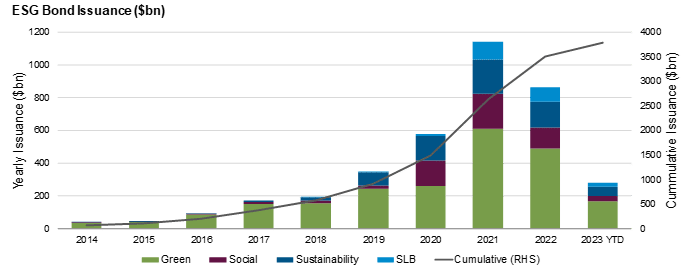
Investing
Green bonds: a rapidly growing market for sustainable investments
In the face of growing environmental and social challenges, Madhushree Agarwal explores what green bonds can offer investors.
The world today faces ever growing environmental and social challenges, leaving many investors with a desire to support positive, sustainable development. ESG (environmental, social, and governance) bonds can offer investors a solution which aligns with their values, without the need to compromise on their long-term financial goals.
ESG bonds can take different forms, including green bonds, social bonds, sustainability bonds, and sustainability-linked bonds. So what’s the difference between them?
Green bonds finance environmentally friendly projects such as renewable energy initiatives like wind farms or solar installations, clean transportation, and sustainable agriculture.
Social bonds finance projects which create positive social outcomes in communities, such as access to food security, affordable housing, and job creation. In many cases these help specific groups such as those living below the poverty line, the unemployed, women, and those with disabilities.
Sustainability bonds are used to finance a combination of green and social projects.
And last but definitely not least, we have sustainability-linked bonds. These are based on whether the issuer achieves pre-defined sustainability goals within a timeframe – they could be climate related such as reducing emissions or based on the broader sustainable development goals (SDGs) developed by the United Nations (UN). These bonds can play a key role in encouraging companies to make sustainability commitments at the corporate level, particularly through aligning to the UN SDGs or the Paris Agreement, an international treaty on climate change.
The ESG bond market has seen rapid growth over the last few years, with over US$3 trillion issued by the end of 2022. This has been dominated by green bonds as investors have shown increasing interest in environmentally friendly investments and governments have shown increasing support for green finance, by creating incentives and setting standards.

SOURCE: PIMCO. As of 31 March 2023. Source: Bloomberg
However, last year’s exceptional market volatility and rising interest rates slowed the supply of new green bonds, just as it did for the broader bond market. Sentiment on ESG investing also dampened due to worries over greenwashing – where businesses or organisations claim to be more committed to environmental issues than they actually are.
This year we have seen a strong rebound in green bonds. In fact, according to data gathered by Bloomberg, green bond sales saw the busiest quarter on record during Q1 2023. Global sales of new green bonds reached US$163.9 billion in the first quarter, breaking the previous record of US$143.1 billion set in the final quarter of 2021. Sales of the bonds are up 32% year-on-year as borrowers capitalised on favourable conditions before the volatility brought on by the recent banking turmoil.
January saw the best start to a year for bond returns on record – which helped fuel a huge debt-sale by governments and companies worldwide. This included Ireland which issued its second ever sovereign green bond raising €3.5 billion, and India made its market debut with a US$1 billion sovereign green bond. Corporate issuers also came to the market for the first time.
Looking ahead, global green bond sales could reach around US$600 billion this year, which would exceed 2021’s record levels, according to BNP Paribas SA. Thanks to this rapid growth, green bonds are becoming an important component of ESG-focused fixed-income portfolios.
The exponential rise of green bonds is a truly exciting prospect for investors with an interest in creating a more sustainable future. As the world continues to face environmental adversity, green bonds will continue to play a significant, growing role in fixed income markets for generations to come.
Clients of Nedbank Private Wealth can get in touch with their private banker directly to understand how we manage money, or call +44 (0)1624 645000 to speak to our Client Services team.
If you would like to find out more about how we can help clients manage their investments, please contact us on the number above or via our Contact us page.
Investments can go down, as well as up, to the extent that you might get back less than the total you originally invested. Exchange rates also impact the value of your investments. Past performance is no guide to future returns. Any individual investment or security mentioned may be included in clients’ portfolios. They are referred to for information only and are not intended as a recommendation, not least as they may not be suitable. You should always seek professional advice before making any investment decisions.
Source: Bloomberg, PIMCO, Robeco, BNP Paribas SA, Nedgroup Investments
Author

Madhushree Agarwal
Investment Analyst , London
In 2015, Madhushree joined the London office of Nedgroup Investments, a sister company of Nedbank Private Wealth, as an investment analyst. She focuses on macroeconomic asset allocation and fund research.
Madhushree holds an MSc in Investment and Wealth Management from Imperial College Business School and has a first class BSc (Hons) degree in Banking and International Finance from Cass Business School. Madhushree is also a Chartered Financial Analyst.
RELATED NEWS
You may also be interested in the following Insights
Sign up for our updates
Stay up to date with the latest news, insights, and opinions from Nedbank Private Wealth by signing up to our newsletter. You can also register to be invited to our virtual events and hear directly from a wide range of experts. Sign up below. You can unsubscribe at any time.













